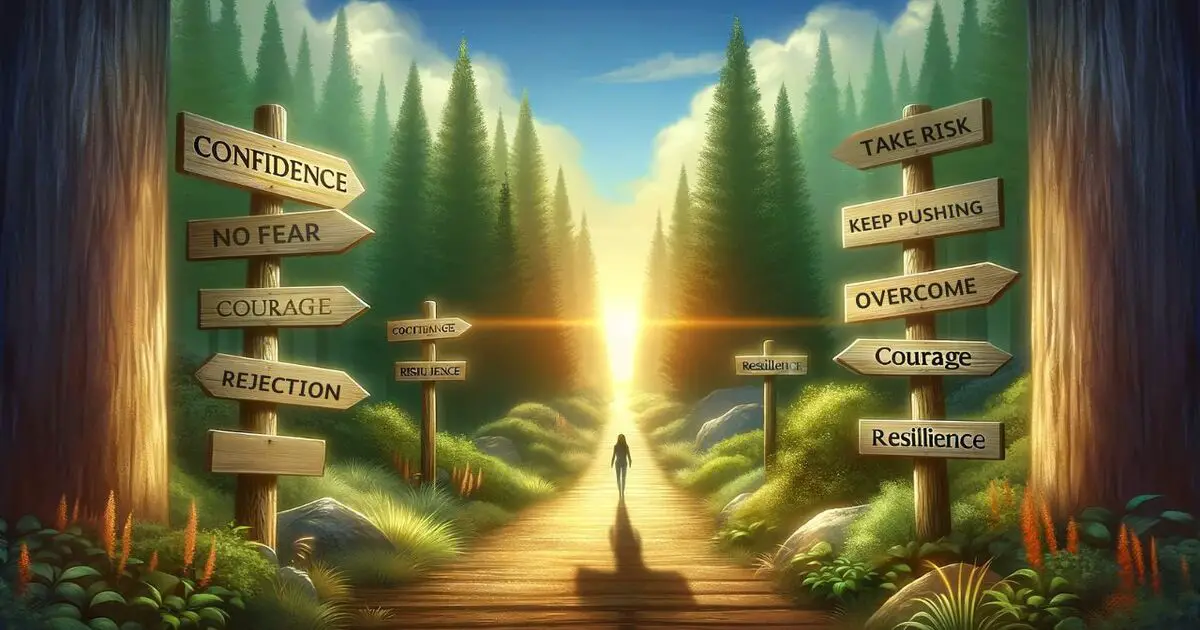8 Traits That Self-Assured People Have!

Self-assured people don’t chase approval; they act from alignment. They make clear decisions, recover fast from doubt, and stay authentic in any room.
These outcomes aren’t mysterious; they’re built through specific traits and daily habits that anyone can practice. This guide explores the qualities of confident individuals, the habits that build true self-belief, and a quick 7-minute morning routine you can begin right away.
You’ll also learn how self-assured differs from arrogant or narcissistic behavior, so confidence feels grounded, not performative. Let’s build a version of confidence that lasts.
Traits:
Quick-start routine:
How Self-Assured Are You?
Take this quick quiz to discover your level of self-assurance. Answer honestly to get the most accurate result!
Question goes here
Quiz Complete!
Your score is 0
Message based on score.
What does self assured person meaning?
As a professional life coach, I often get asked: What is self-assurance, and why does it matter?
A self-assured person has an inner sense of confidence, worth, and belief in their abilities. It means having faith that you have what it takes to handle challenges, pursue opportunities, and become the person you wish to be.
When you’re self-assured, you don’t second-guess yourself or give too much weight to naysayers and critics. You understand your inherent value as a human being, regardless of worldly measures of success.
You can brush off failures and rejections without feeling crushed. And you feel worthy of love, joy, fulfillment, and prosperity.
Self-assurance is a deep knowing that you’ll be alright, maybe not today, this week, or even this year. You are resilient and resourceful enough to recover from setbacks. It’s recognizing the seeds of greatness within, even if they haven’t fully germinated yet.
This unshakeable belief fuels motivation, making it easier to show up authentically, take risks, and weather turbulent times. It also magnetizes opportunities and positive people, creating a snowball effect for growth.
When you trust in yourself, you don’t give away your power or wait for the world to validate you. Your purpose drives you forward.
So if you want to live boldly and reach your highest potential, nurture your self-assurance muscle! It will serve you well on the long, winding road to self-actualization.
Subscribe to Create Higher Vibrations!
Get Inspiration and Practical advice straight to your inbox.
8 Traits Of A Self-Assured Person
1.) An Optimistic Outlook
I move through life with an attitude of optimism, even when facing daunting odds. I don’t deny the reality of challenges, but also don’t catastrophize them.
Instead, I break down problems and hone in on actionable solutions. My positive mindset fuels my belief that I have what it takes to overcome obstacles.
When things feel bleak, I consciously shift my perspective. I remind myself that no situation lasts forever – this too shall pass. I also focus on the progress made rather than get bogged down in how far I have left to go.
Daily small wins fuel my optimism and resolve.
My buoyant nature attracts opportunities and people. And my ability to lift others makes me feel worthy and significant. Spreading hope and cheer, especially during turmoil, is profoundly rewarding.
My optimistic outlook sustains my drive and also makes the journey lighter.
2.) Trust and Assertiveness
I have full faith in my expertise, perspectives, and decisions. This intrinsic trust provides an internal compass that guides my path without second-guessing.
I don’t doubt my voice or feel I need external validation. I speak up assertively, expressing my authentic thoughts with clarity and confidence.
My self-assurance allows me to tune out naysayers who may try to undermine me. I don’t feel the need to dominate conversations or force my agenda.
I state my standpoint, make logical arguments, and leave it at that. I don’t take opposing views personally or let them erode my self-trust.
This assertive yet flexible approach has served me well professionally and personally.I assert my needs and boundaries with confidence and respect. My ability to communicate empowers me to solve problems and reconcile differences through open dialogue.
Discover Your Inner Self. Join Our Self-Mastery Program.
Self-Mastery Coaching gives you the space, tools, and guidance to grow, reflect and discover your values and inner strength.

3.) Goal-Oriented and Progress-Driven
I’m naturally driven to achieve. I stay focused on my goals and create detailed plans that balance ambition with practical steps.
With clear targets in sight, I can visualize succeeding, and this fuels my motivation. Even with multiple priorities, I don’t lose sight of my North Star objectives.
My progress-driven mindset keeps me from getting complacent. I regularly track metrics to quantify my improvement across skills, behaviors, and outcomes. These small milestones affirm that I’m headed in the right direction.
On days when forward momentum ebbs, I review how far I’ve come rather than how far I have to go.
My innate need for growth feeds my self-assurance. Constructive dissatisfaction fuels my continuous improvement. But it’s balanced with gratitude for each step of progress made along the winding road to self-actualization.
4.) Decisiveness and Understanding Capabilities
When faced with difficult decisions, I think critically and weigh options judiciously. But I don’t agonize or dither endlessly.
I gather enough data to make an informed choice that aligns with my goals and values. This decisive approach gives me the clarity and conviction to act.
Just as important as choosing swiftly is knowing when NOT to decide immediately. I discern situations that require further analysis before committing.
My self-awareness and honesty about my abilities allow me to determine when I need more expertise or counsel. This nuanced understanding of my capabilities makes my decisiveness even more impactful.
I don’t view reversals as failures if new information emerges. Being adaptable doesn’t diminish my resolve. It simply means I’m open to changing course quickly and confidently if needed.
My ability to pivot strategically while staying principled is a hallmark of self-assurance.
5.) Emotional Stability
Staying even-keeled through ups and downs enables me to handle stressful situations with composure. I don’t repress emotions but rather process them mindfully so they don’t control my responses. This healthy self-regulation helps me confront challenges rationally.
My peace comes from a self-respect that doesn’t depend on external validation or outcomes. I know my worth transcends worldly success, and failures don’t dilute my intrinsic value. This detached perspective allows me to face criticism, rejection, and obstacles with grace.
When I nurture inner quiet confidence, I can handle chaos without losing control. My emotional resilience and stability give me an unflappable presence. I navigate chaos and uncertainty with savvy, optimism, and balance, demonstrating self-assurance.
6.) Confidence: The Foundation
As someone self-assured, confidence is my bedrock. I have an unshakable faith in my abilities and the decisions I make. When tackling challenges, I don’t doubt myself or question if I have what it takes. My self-belief propels me forward to turn my visions into reality.
Failure doesn’t faze me either. I view setbacks as opportunities to recalibrate and come back stronger. Each stumble makes me more resilient and adds to my confidence.
I celebrate the smallest of wins because I know that consistent progress, however incremental, leads to success. My unwavering confidence makes me a formidable force – one that persists in the face of obstacles.
7.) Assurance in Self-Compassion
I uphold kindness as my core value, including being compassionate with myself. When I come up short or make a mistake, I don’t admonish myself. Instead, I look at it as part of my growth trajectory. I course-correct without judgment and focus on the lessons learned.
My self-compassion has taught me not to be a harsh critic of my shortcomings. I celebrate my strengths and achievements wholeheartedly.
But I also acknowledge my weaknesses and limitations with gentleness and understanding. This balance allows me to nurture my best self without minimizing my flaws.
My self-assurance stems from embracing myself holistically – triumphs, failures, and all. With self-compassion as my anchor, I can weather life’s ups and downs with grace.
8.) Taking Responsibility
Accountability is the cornerstone of my self-assurance. When facing outcomes, good or bad, I don’t play the blame game. I take complete ownership, knowing that I’m responsible for all my actions and decisions.
This mindset makes me proactive instead of reactive. If a project goes sideways, I immediately reflect on how my leadership, planning, or execution could be improved. Rather than make excuses or point fingers, I take constructive steps so I don’t repeat mistakes.
Owning my circumstances also prevents me from seeing myself as a victim. I don’t give away my power or wait for external forces to dictate my reality. The locus of control lies firmly within me.
This empowering perspective is what makes me feel self-assured as I navigate life’s twists and turns.
Developing Self-Assurance:
Practical Strategies for Growth
Gaining self-assurance is a journey of personal development that involves understanding and overcoming self-doubt. By incorporating practical strategies, you can cultivate a more confident and self-assured mindset.
Here are some effective approaches:
Remember, the path to self-assurance is unique for everyone. Be patient with yourself and recognize that building confidence is a gradual process.
Common myths about self-assurance
Many myths about self-assurance can prevent people from achieving it. Here are some of the most common myths:
These myths are all false. Self-assurance is not something that you are born with; it is something that you can learn and develop. It is not the same as arrogance, and it is not only for perfect people.
You can be self-assured and humble at the same time, and self-assurance is not a sign of weakness.
If you are struggling with self-assurance, it is important to challenge these myths. Remember, self-assurance is a skill that you can learn and develop. With practice, you can become more self-assured and achieve your goals.
How to deal with a non-self-assured Person
Dealing with a non-self assured person can be challenging. They may be constantly seeking approval, be afraid to take risks or have difficulty making decisions. Here are some tips for dealing with people who are not self-assured:
Help people build confidence and achieve success by following these tips.
Final Takeaway
Confidence isn’t a gift you’re born with; it’s a skill you build. Even the most magnetic people started with doubt, then chose belief over fear, one habit, one small win at a time.
You can do the same. Stand taller. Speak kinder to yourself. Celebrate progress. With each step, you rewrite the story you tell about who you are.
Don’t wait for permission. Start shaping your self-belief now. The world needs your light, not when you feel ready, but today.
.




